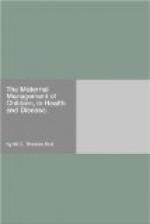What is the quality of the milk?—It should be thin, and of a bluish-white colour; sweet to the taste; and when allowed to stand, should throw up a considerable quantity of cream.
What is its age?—If the lying-in month of the patient has scarcely expired, the wet-nurse to be hired ought certainly not to have reached her second month. At this time, the nearer the birth of the child, and the delivery of its foster-parent, the better: the reason for which is, that during the first few weeks the milk is thinner and more watery than it afterwards becomes. If, consequently, a new-born infant be provided with a nurse, who has been delivered three or four months, the natural relation between its stomach and the quality of the milk is destroyed, and the infant suffers from the oppression of food too heavy for its digestive power.
On the other hand, if you are seeking a wet-nurse for an infant of four or five months old, it would be very prejudicial to transfer the child to a woman recently delivered; the milk would be too watery for its support, and its health in consequence would give way.
The nurse herself should not be too old!—A vigorous young woman from twenty-one to thirty admits of no question. And the woman who has had one or two children before is always to be preferred, as she will be likely to have more milk, and may also be supposed to have acquired some experience in the management of infants.
Inquire whether she is ever unwell while nursing?—If so, reject her at once. You will have no difficulty in ascertaining this point; for this class of persons have an idea that their milk is renewed, as they term it, by this circumstance, monthly; and, therefore, that it is a recommendation, rendering their milk fitter for younger children than it would otherwise have been. It produces, however, quite a contrary effect; it much impairs the milk, which will be found to disagree with the child, rendering it at first fretful,—after a time being vomited up, and productive of frequent watery dark green motions.
Last of all, what is the condition of the child?—It ought to have the sprightly appearance of health, to bear the marks of being well nourished, its flesh firm, its skin clean and free from eruptions. It should be examined in this respect, particularly about the head, neck, and gums.
If a medical man finds that both mother and child answer to the above description, he has no hesitation in recommending the former as likely to prove a good wet-nurse.




